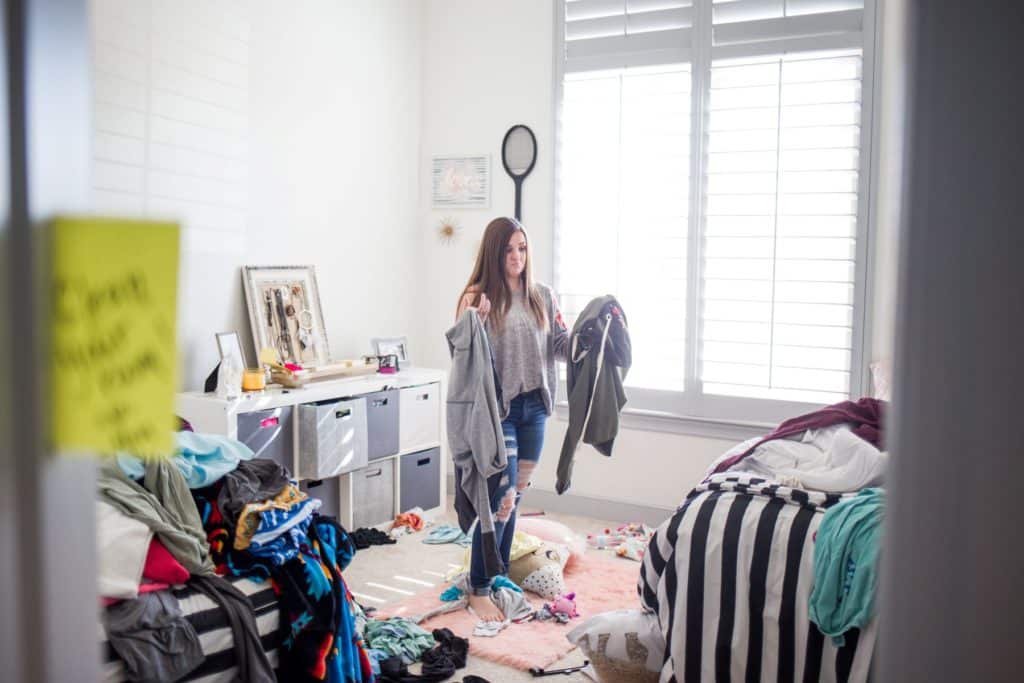
My scissors were missing and I had a pretty good idea who took them. But I knew finding them would be challenging since I was about to encounter a barrage of stuff.
As I entered my daughter’s room, mismatched socks, black leggings, a green t-shirt along with a pile of—I could only assume was dirty clothes—covered the floor. As if I was in an obstacle course, I waded my way over mounds of bags and stacks of books to her desk that held piles of papers, scattered colored pens, and bottles of nail polish.
After about fifteen minutes of rustling through the clutter, I gave up since I was unable to find my scissors.
A Teen’s Messy Bedroom Can Be Frustrating
This was how my 18-year-old daughter’s room used to look on a good day.
When she was younger, we had heated arguments over her messy room and battles to get her to clean up after herself. But the arguments didn’t solve the issue, and our relationship became strained. (You may also like to read: Here’s How To Fix A Difficult Relationship With Your Teen)
I’ve always prided myself, even as a teenager, on having a neat room. Everything had a place, and I never left anything on the floor. I always made my bed and placed my laundry in the basket. Being organized and clutter-free made me feel calm and happy so whenever I encountered things out of place, I felt anxious and upset.
But worse, I also felt like I failed as a parent since I wasn’t able to teach my daughter how to be neat.
Where did I go wrong? What should I have done differently? I also sometimes felt as if she was being oppositional by choosing not to put things away even though she knew it made me upset. So whenever I tripped over her sneakers on the floor or saw a pile of dirty dishes next to her bed, I felt immense anger. But my anger didn’t change her behavior.
How to handle a teen who won’t clean up
I decided to do some research. Most people think of ADHD as a young boy unable to sit still in class. But ADHD can present differently depending on the person. One hallmark of the disorder is being disorganized, and it turned out that my daughter had this and other indicators.
When she received the diagnosis, I realized that her being messy was not an affront to my authority or parental rules, or a sign of disrespect, but instead that this was a skill that was challenging for her to learn.
Her behavior had nothing to do with me. I had been misinterpreting the situation all along.
Related: 8 Genius Responses For When Your Teen Is Being Lazy And Entitled (We Say in Our Head)
Is a messy teen bedroom a sign of a problem?
She’s a talented artist who creates incredible art. I can barely etch out a stick figure. If you asked me to recreate one of her paintings, I wouldn’t know where to begin. And then, if you told me to do that daily, I would feel helpless.
I’m guessing that’s how she feels about organizing her room every day.
After her diagnosis I read KC Davis’s book, How to Keep House While Drowning.
Even though I don’t have ADHD, reading the book was a turning point for me. One of the key concepts in the book is that being messy doesn’t equate to a moral failing rather it’s morally neutral. Being neat doesn’t mean you are a good person and being messy doesn’t mean you are a bad person.
You could be a serial killer and be extremely neat since your organizational skills have nothing to do with your morality. Being disorganized is merely a skill that people need to learn. But people with ADHD, like KC Davis, needed to learn this skill in a different way than people who don’t have ADHD. This applies to anyone whose brain works differently.
In her book, she discussed how she tried organizational techniques for people who don’t have ADHD, and none of it worked for her. She had to figure out methods that worked for someone who had ADHD.
Up until this point, I didn’t even realize that I was equating being a good person with being neat. But after reading her book, I knew I held that common belief.
And now it seems ridiculous that I was so angry about a messy room because my daughter is an incredibly good and kind person. (Editor’s note: a drastic change in your teen’s behavior, such as an organized child suddenly keeping an untidy room or an adolescent who trashes their personal space, could be experiencing mental health issues. Make sure you talk to your family doctor or a licensed mental health therapist to discuss your concerns.)
Now that she’s at college, I can see her bedroom floor and her desk is clear of clutter. Most of her artwork that she created still remains on the walls but her clothes, knickknacks, and other possessions are with her at school. I never thought I would feel this way, but I miss her mess.
I’ll admit that the first week she was gone I reveled in the pristine condition of my house.
Her messes were not just confined to her bedroom. There was an array of shoes dispersed throughout the kitchen, dirty dishes on the sofa, and jackets strewn on the banisters (but mostly the floors). But as the weeks wore on, I found myself staring at the empty floors, wondering when I would see her clothes again.
After the transformation of my views about messiness, instead of anger, I often used humor with her about her items around the house. Like when I asked her, “Is this pile of dirty clothes some sort of science experiment to test the height versus the smell?”
Or I asked her, “Do the crumbs you leave from the kitchen to upstairs help you to find your way back to your bedroom?”
She always laughed, which strengthened our relationship instead of weakening it as the anger did.
I miss these lighthearted interactions. I miss her mismatched socks on the kitchen floor.
But most of all I just miss her.
Parenting teens and tweens is hard, but you don’t have to do it alone. These posts can help:
Signs Your Teen May Be Suffering from a Lack of Executive Functioning Skills
How To Stop Nagging and Reconnect With Your Teen
Helping my Teens Manage ADHD Was a Learning Experience for Both of Us
Why Teens Lack Motivation And How To Help Your Teen Be More Motivated






Leave a Comment